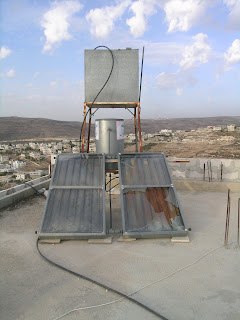Also of interest is the financial support given to East Jerusalem settlements by Americans. Such donations are even tax deductible in the US which equates to US governmental support for activities deemed illegal by the Geneva Convention, UN resolutions and international law. A detailed report of this concern can be found at: http://www.kibush.co.il/show_file.asp?num=36348
The al-Ghawe family home with the Israeli flag flying.
Two MPTers spent two nights of protective presence at the al-Ghawe home in East Jerusalem. The home is part of the Sheik Jarrah neighborhood that was constructed in 1956 by UNRWA, United Nations Relief and Works Agency. It has been reported that Istanbul opened long closed records and some information thus gained influenced the Israeli courts. The al-Ghawe family was evicted at the beginning of August of this year and has been living on the street across from their home. The family’s shelters and belongings have been demolished and confiscated numerous times. Internationals have often been present to provide support and protection.
The two MPTers started their watch on the evening of Saturday, Oct. 31, 2009. Taking turns sleeping and standing watch so that the family and other internationals (who had been spending multiple nights at the site) could get some much needed rest; the night passed uneventfully.
Sunday morning, Nov.1, breakfast was served, kids sent to school, and most family members had moved into neighboring homes to clean up for the day leaving just three internationals and one family member at the site. Suddenly eight vehicles and about 25 uniformed police and soldiers appeared and began tearing down the tent and taking all the belongings. The MPTers immediately began taking pictures and calling other internationals in the area. One MPTer tried to hold onto a stack of blankets but it was taken away and the MPTer was escorted across the street. The MPTer realized that she had forgotten her own bag near the family’s things. She was allowed to retrieve it. By the time the other internationals arrived, the family’s belongings were all packed up and the soldiers and police were leaving.
Father, blue jacket - left of center, talks with officer
The father of the family spoke with a number of the officers to no avail. Demolitions and confiscation have become almost routine. The look of frustration and fatigue was evident on his face. The family puts up a meager shelter with some donated pads and blankets, chairs, dishes, a gas cook stove, water containers and the like. In a matter of days the soldiers and police arrive to take it all.
 Removing the tent and beds.
Removing the tent and beds. Two vehicles loading while soldiers watch.
Two vehicles loading while soldiers watch.It was a very disturbing event with little regard shown for the family and with some soldiers seeming to enjoy the “outing”. The mother of the family arrived after most things were already taken. She began screaming at the soldiers and police in Arabic. Most watched impassively, but at least one snickered. After the demolition was complete, one soldier came over and shook hands with a settler who was staying in the al-Ghawe’s home from which they have been evicted.
 It is hard to know another's thoughts.
It is hard to know another's thoughts. A neighbor youth, an officer and a settler watch.
A neighbor youth, an officer and a settler watch. The mother gives a passionate interview after the soldiers have left.
The mother gives a passionate interview after the soldiers have left.The camp was reestablished the same day and MPT maintained a presence along with other internationals for the next 24 hours. On Monday morning, the family moved some of their belongings to a neighbor’s yard. After three police cars drove by slowly, they took down the tent and put it in the neighbor’s yard as well.
On Monday morning the MPTers and other internationals staged a short silent protest at the American Consulate which is located about a half mile from the Sheik Jarrah area. The press arrived. Police observed but did not interfere.





 Some of the 95 trees destroyed in Burin by settlers last month.
Some of the 95 trees destroyed in Burin by settlers last month. Kick-off of the "10,000 Trees for Nablus" Campaign in Burin
Kick-off of the "10,000 Trees for Nablus" Campaign in Burin  Burin schoolgirls join in the walk to the field for the planting.
Burin schoolgirls join in the walk to the field for the planting.
 Students planting an olive sapling. Teachers from the Burin Girls School in the background.
Students planting an olive sapling. Teachers from the Burin Girls School in the background. 








































